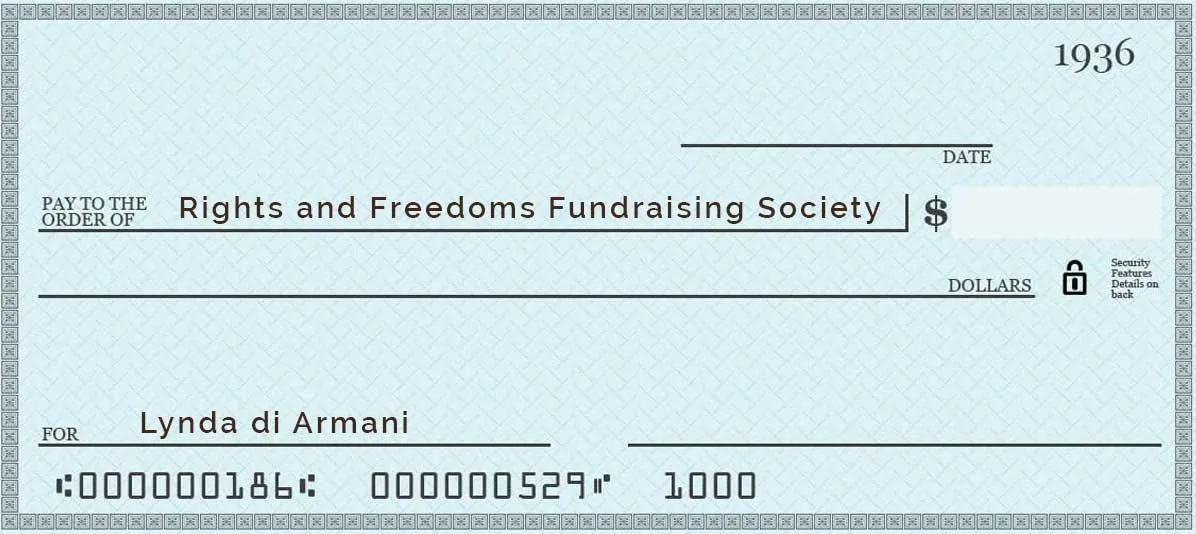

FREE SPEECH
Lynda di Armani
In June 2023, Lynda di Armani attended a public school board meeting in Chilliwack, British Columbia. A grandmother and former school employee, she went to the meeting to express her concerns about a potential conflict of interest at the board. It had come to light that the board member who was seeking school funding to promote Pride events in schools was also the marketing director for the local Pride society. Ms. di Armani’s remarks were brief and calm.
The school board Chair, Willow Reichelt, along with the Vice-Chair, Carin Bondar, immediately interrupted and muted Ms. di Armani’s presentation, baselessly claiming that her remarks were somehow “discriminatory” and that “[t]here is no conflict of interest when you’re talking about basic human rights.”
After being interrupted four times in rapid succession, Ms. di Armani was ordered to sit down before she had finished. The Chair then muted the livestream of the public meeting. The viewing audience could not then hear Ms. di Armani’s response or the statements of the Chair. Unfortunately, this is part of a pattern of censorship at this school board.
The Board’s message has been clear: if we dislike your expression, we will silence you. We will strike your voice from the public record in the name of “human rights” and preventing “discrimination.”
Fortunately, the Supreme Court of Canada has been very clear: public schools are government bodies subject to the Canadian Charter of Rights and Freedoms. Section 2(b) of the Charter protects the freedoms of thought, belief, opinion, and expression of all Canadians, including at school board meetings.
School board censorship silences debate. It violates the right of speakers to express themselves. It violates the right of board members and the listening public to access a diversity of perspectives. It disrupts democracy and undermines democratic accountability.
Unfortunately, the problem of “school board censorship” is not unique to British Columbia.
It happened to Trustee Mike Ramsay in Waterloo, Ontario. It happened to former elementary school teacher Carolyn Burjoski in the same district. Increasingly, school boards across the country are neglecting their Charter obligations to protect expression. Instead, they are disciplining trustees, silencing dissent, and depriving the public of necessary debate on critical issues.
Ms. di Armani knows that school boards should not mute disagreement. On the contrary, disagreement and debate are part of a healthy democracy.
Thanks to your donations, JCCF lawyers helped Lynda di Armani file a constitutional challenge against the school board in the Supreme Court of British Columbia.
She is asking the Court to declare that the school board violated her Charter rights and the Charter rights of the listening public. She seeks a Court Order that allows the public to record school board meetings themselves as a measure that would prevent school board censorship in the future.
We, alongside the JCCF, will continue to help Lynda di Armani fight censorship in Chilliwack through her constitutional challenge in the Supreme Court of British Columbia. Will you join us in this fight for our basic rights?
Donate to Support Lynda di Armani's Case
Donate By Mail
Attn: Lynda Di Armani
c/o Rights and Freedoms Fundraising Society
P.O. Box 21004
Chilliwack, BC V2P 8A9

Lynda di Armani News and Case Updates

James Kitchen Responds to Commissioner’s Attempt to Subvert the Legal Process
Letter From B.C.’s Office of the Human Rights Commissioner
NOVEMBER 15, 2024
B.C. Human Rights Tribunal 1270 – 605 Robson Street Vancouver, BC V6B 5J3
Attn: Britt S., Case Manager
Re: British Columbia Teachers Federation obo Chilliwack Teachers Association v. Barry Neufeld, HRT Case Number CS-01372
Please find enclosed a document book of academic articles that the Commissioner intends to rely on in her written submissions, given that we are now unable to call Dr. Travers. These outline the formation, effect and rhetorical work of moral panics, including discussion of the claim that gender affirming care or support is child abuse. We consider that these articles reflect social fact, and the Tribunal can take notice of their content given its specialized knowledge in assessing claims under s. 7 of the Code and whether or not speech is discriminatory or amounts to hate speech.1 However, for the benefit of transparency, we are providing notice and copies to all parties well in advance of the deadline for our written submissions.
Sincerely,
Maria Sokolova Staff Lawyer
B.C.’s Office of the Human Rights Commissioner
James Kitchen Responds...
JAMES SM KITCHEN
Barrister & Solicitor
203-304 Main St S, Suite 224 Airdrie, AB T4B 3C3
587-330-0893
November 18, 2024
VIA EMAIL
BC Human Rights Tribunal 1270 – 605 Robson Street Vancouver, BC V6B 5J3
Attention: Devyn Cousineau, Tribunal Member Robin Dean, Tribunal Member Laila Said-Alam, Tribunal Member
Dear Panel Members:
RE: BCTF obo CTA v Barry Neufeld, BCHRT Case No. CS-001372—BC Human Rights Commission’s Proposed Opinion Evidence
This submission responds to the BC Human Rights Commission’s effort to enter opinion evidence in the absence of an expert witness, as well as its single argument for doing so. The Commission relies on Sarah Blake’s Administrative Law in Canada, 7th ed (LexisNexis Canada, 2022) at §2.14, citing no particular pinpoint.
The starting point is that the Tribunal’s expertise is in discrimination. The Commission’s assertion that the Tribunal may take notice of “the formation, effect and rhetorical work” of moral panic “given its specialized knowledge in assessing claims under s. 7 of the Code” is a bait-and-switch, and moreover, a self-defeating argument. The Tribunal’s expertise in assessing discrimination claims would lend it no particular expertise in assessing moral panic, and its presumed lack of expertise in this social science subject area would admit of need for expert guidance by way of an expert witness. On the other hand, had the Tribunal specialized expertise in the area of moral panic, it would not require a surfeit of material on the subject in order to divine the presence or absence thereof.
Moving to the administrative law textbook on which the Commission relies for its proposition, Ms. Blake’s remarks alternate between truisms and circumstances that bear little resemblance to this particular matter. Beginning with the second paragraph, it is unclear what “lay people…not schooled in the rules of evidence” to which Ms. Blake refers, but certainly her characterization does not apply to this panel, the legal acumen of its members combining to bring practical experience in eight distinct areas of the law to their present appointment.
That a panel of this particular proficiency should require 23 articles exploring the topic of moral panic in order to reach a conclusion as to whether discrimination has occurred seems improbable. Accepting such a superfluous volume of unqualified opinion material would stray far outside the central purpose of the inquiry—a practice Ms. Blake would seem to discourage: “As the most important evidence is that which concerns the key facts on which the decision will turn, the key factual issues should be identified so as to avoid straying too far from the central purpose of the inquiry”.
Ms. Blake continues to the effect that the purpose of admitting evidence is “to keep the hearing focused on the matters to be decided”. Indeed, the Tribunal should have regard to “[t]he purpose and subject matter of the proceeding described in the notice of hearing or in a statement of the allegations”. This seems uncontroversial. It is also the reason the Respondent objects to the admission of 450 pages of gratuitous scholarship focused on moral panic, let alone in the absence of an expert witness who might be cross-examined on its contents.
The administrative law text on which the Commission relies does not make the case the Commission claims. The following summarizes the text’s thrust:
· While “[a] tribunal may use its own expertise to assess whether to accept or reject [an] opinion”, there is no reason to believe such an opinion is to be admitted without an expert in tow;
· While “[a] tribunal may take notice of commonly accepted facts and generally recognized facts within its specialized knowledge”, there is no reason to believe a tribunal may take notice of “facts” outside its specialized knowledge;
· Even where “[a] tribunal may take notice of commonly accepted facts and generally recognized facts within its specialized knowledge…a tribunal should not rely on its ability to take notice of common facts as the basis of its finding on an important disputed fact”;
· While “[e]xpertise may assist a tribunal in drawing inferences from primary facts…the expertise of the tribunal should not be the basis of an essential finding of fact upon which a decision turns”.
While the Morgan Criteria of the R v Find1 epoch—facts so notorious or generally accepted as not to be the subject of debate among reasonable persons or facts capable of immediate and accurate demonstration by resort to readily accessible sources of indisputable accuracy—are no longer the single standard for “judicial” notice in all circumstances, they continue to apply strictly where such “facts” are positioned proximate to the issue in dispute and its disposition.2 The Commission’s statement, “These outline the formation, effect and rhetorical work of moral panics, including discussion of the claim that gender affirming care or support is child abuse” admits of such proximity; accordingly, the Morgan Criteria would apply to oust judicial notice of the social facts in question, which are obviously in dispute and upon which reasonable people are wont to disagree. Such facts, even social facts, would need to be proven.
The Tribunal can tell whether or not there is discrimination quite apart from whether or not moral panic occurred. Put another way, the point of the exercise is not to assess whether moral panic happened, rather whether discrimination happened. Since there is no reason to believe “moral panic” is either sufficient or necessary for the occurrence of discrimination, the Tribunal cannot be assisted by opinion on the topic, with or without an expert. Moreover, attempting to foist the accusation of moral panic on the Respondent crosses the line between finding fact and projecting a caricature.
The Respondent therefore opposes the admission of the Commission’s proposed opinion evidence.
In the event the Tribunal rules the Commission’s proposed social fact evidence admissible, the Respondent will enter a not insubstantial amount of social fact evidence to counter the materials proposed by the Commission. The admission of such a prodigious quantity of written opinion evidence absent an expert would compel the Respondent to enter an equal volume of scholarship defeating the proposition. “Social ‘facts’” are, after all, in the eye of the beholder.
Regards,
James SM Kitchen
Barrister & Solicitor Counsel for Barry Neufeld

Stay Informed
Stay informed with the latest updates on our cases, research and events.
©️ Copyright 2025 Rights and Freedoms Fundraising Society. All Rights Reserved.
